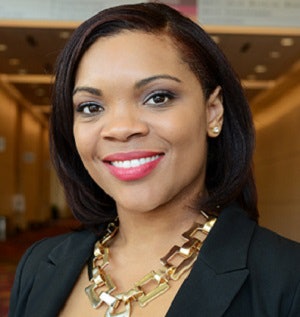Dr. Tomika Ferguson recalls the words that were the genesis of her ongoing research on women of color in college athletics. As an elite student-athlete, she was once described as a “workhorse” with “natural athletic ability.”
Ferguson, an assistant professor in the department of educational leadership at Virginia Commonwealth University, like many young educators today, is not only writing and publishing about these issues, she is also practicing the solutions. She is the founder of the Black Athlete Sister Circle (BASC), a program for student-athletes at Division I institutions.
 Dr. Tomika Ferguson
Dr. Tomika FergusonFerguson travels once a month to James Madison University in Harrisonburg, Virginia, to meet with a group that is the foundation of her BASC program. She is particularly interested in the anecdotes of minority women athletes who are seeking a support system as well as the camaraderie of their peers.
She knows all too well the triumphs and struggles of these young women. An excerpt from a University of Virginia news release in 2006 explains why: “Virginia’s Tomika Ferguson, the school-record holder in the triple jump, broke her own school record in the NCAA Championships to earn sixth place at the nationals and earn All-American honors. It is the first All-American honor of her career and the first for a Cavalier horizontal jumper since 2003.”
That was a big deal not only for UVA but even more so for Ferguson’s hometown of Appomattox, Virginia. But she was facing challenges as a young Black female athlete at a predominantly White institution. It was during that time that terms like “workhorse” and “natural athletic ability” were applied to her. She says these terms may not have been intended to demean her but nevertheless represented a stereotype of Black female athletes. In 2007, shock jock Don Imus made infamous comments about Black women basketball players, calling them “nappy headed hoes” and “jigaboos,” thereby heightening the debate over racism and misogyny.
“I do research on African-American athletes because I was one who felt silenced,” says Ferguson. “I did not navigate all the spaces well. My research has been my way to give a voice to women who might be dealing with issues of sexuality, race, gender and socio-economic status.”
When she entered graduate school at Indiana University, Ferguson began focusing on her research as she completed her master’s and doctoral degrees in higher education. Her dissertation, titled “I Can Do More Things”: How Black Female Student-Athletes Contend with Race, Gender, and Stereotypes,” identified seven themes that characterize how stereotypes influence the college experiences of Black female student-athletes.
The themes are: becoming an athlete; the intersection of Blackness, womanhood and athletics; the coach-player relationship; establishing an identity; stereotype awareness; consequences of experiencing stereotypes; and, ways to improve the Black female student-athlete experience.
The dissertation contained narratives of six participants from women’s basketball, track and field, and volleyball, obtained through in-depth, semi-structured interviews. Ferguson later collaborated with James Satterfield and co-wrote a chapter, “Black Women Athletes and the Performance of Hyper-Femininity,” in Critical Perspectives on Black Women and College Success (edited by Lori Patton and Natasha Groom, 2017).
“A lot of mainstream gender norms and beauty standards are all about White people and don’t celebrate the Black female body — especially the athletic body — which is kind of the antithesis of what is considered beauty for all women,” she tells Diverse in an interview.
“One of my findings was that at times Black women college athletes would over-perform and over-exaggerate feminine qualities and standards of beauty,” Ferguson says, adding that attire, hairstyles and makeup may reinforce the desired image. As an example, Ferguson notes, “One of the women in the study talked about how she would ‘beadazzle’ everything. She wanted people to recognize that she plays basketball but she’s still beautiful.”
“What she is doing with her support group and her research is so needed and would be helpful in any program,” says Dr. Robin Hughes, one of Ferguson’s mentors.
Hughes, executive associate dean and professor of higher education at the Indiana University School of Education at Indianapolis, was Ferguson’s dissertation chair. She says she encouraged Ferguson to focus her research on athletes like herself because of her intimate knowledge of their experiences.
“I think my daughter and any Black female athlete would benefit from the formal mentoring program that Dr. Ferguson created,” Hughes says. “It is well founded in her own research, and she knows the ropes and can really guide them because she has been through the trenches herself.”
This article appeared in the April 5, 2018 issue of Diverse magazine.


















